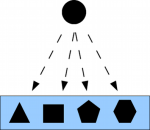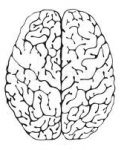The problem of interpreting quantum mechanics (QM) is essentially the problem of making sense out of an objectively indefinite reality–that is described mathematically by partitions. Our sense-making strategy is implemented by developing the mathematics of partitions at the connected conceptual levels of sets and vector spaces. Set concepts are transported to (complex) vector spaces to yield the mathematical machinery of full QM, and the complex vector space concepts of full QM are transported to the set-like vector spaces over ℤ₂ to yield the rather fulsome pedagogical model of quantum mechanics over sets or QM/sets.
Introduction to Partition Logic
This is an introductory treatment of partition logic which also shows the extension to logical information theory and the possible killer application to quantum mechanics.
Introduction to Logical Entropy
This paper, a reprint from the International Journal of Semantic Computing, introduces the logical notion of entropy based on the newly developed logic of partitions that is mathematically dual to the usual Boolean logic of subsets (aka “propositional logic”), and compares it to the usual Shannon entropy.
Quantum mechanics over sets
This paper gives a toy model of quantum mechanics over the field 2, where the vectors can be interpreted as subsets of a universe set, and hence the name: “Quantum mechanics over sets.” It gives the “logic” of QM in the old-fashioned sense of the essential logic of a theory pared down to operations on sets (vectors over 2). This includes the simplest logical treatment of the double-slit experiment, Bell’s Theorem, the probability calculus based on Born’s Rule, and much else (all restated in the context of sets).
Determination through universals
Semiadjunctions (essentially a formulation of a universal mapping property using hets) turn out to be the appropriate concept for applications of category theory in the life sciences.
Information as distinctions
This paper is sub-titled “New Foundations for Information Theory” since it is based on the logical notion of entropy from the logic of partitions. The basic logical idea is that of “distinctions.” Logical entropy is normalized counting measure of the set of distinctions of a partition, and Shannon entropy is the number of binary partitions needed, on average, to make the same distinctions of the partition.
The Logic of Partitions: Introduction to the Dual of the Logic of Subsets
Partitions on a set are dual to subsets of a set in the sense of the category-theoretic duality of epimorphisms and monomorphisms. Modern categorical logic as well as the Kripke models of intuitionistic logic suggest that the interpretation of classical “propositional” logic should be the logic of subsets of a given universe set. The propositional interpretation is isomorphic to the special case where the truth and falsity of propositions behave like the subsets of a one-element set. If classical “propositional” logic is thus seen as the logic of subsets of a universe set, then the question naturally arises of a dual logic of partitions on a universe set. This paper is an introduction to that logic of partitions dual to classical “propositional” logic.
Counting Distinctions
This paper gives the logical theory of information that is developed out of partition logic in exactly the same way that Boole developed logical probability theory out of his subset logic.
Adjoints and Emergence
Given the importance of adjoint funtors in mathematics, it seems appropriate to look for empirical applications. The focus here is on applications in the life sciences (e.g., selectionist mechanisms) and human sciences (e.g., the generative grammar view of language).
Adjoints and Brain Functors
These slides define the potentially important notion of a brain functor which is a cognate of the notion of adjoint functors.








